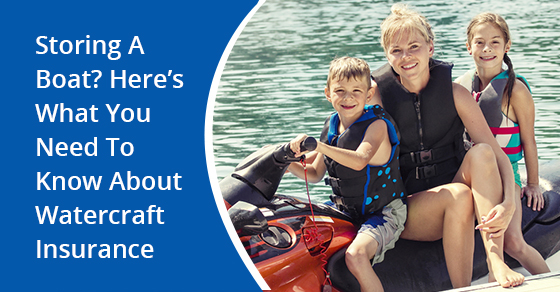
Storing A Boat? Here’s What You Need To Know About Watercraft Insurance
We know that when we purchase a new vehicle, we need to have it insured so that we can drive it. We also know that we need to insure our children when they are old enough to drive, and that when we rent a car we need insurance for that as well.
When it comes to watercrafts, we tend to forget that we need insurance. Watercrafts are vehicles too, so it makes sense that insurance is necessary.
If you own a watercraft, here’s what you need to know about using and storing it:
Winter storage
Unfortunately, Ontario’s climate does not allow us to take a spin around the lake in the dead of winter. When you store your boat, make sure that you have off-season storage coverage. You will need to protect your boat from snow load and (ironically) water damage that could occur in the off-season.
Where you store your boat is also important. Will you be storing your boat in a storage facility or in your garage? You need to let your insurance broker know this information so they can form your policy to include coverage when the boat is not in your care. Are you hiring a professional to winterize your boat? If so, be sure that they carry adequate professional liability insurance. If your boat suffers damage over the winter due to their negligence, it will much be easier for you to recover your costs.
Who will be operating the boat
Besides storing your boat, your broker will need to know who will be operating it in order to create your policy. In Canada, there are legal age restrictions on who can operate a boat and those operators need to be covered.
- Anyone under 12 years of age who isn’t directly supervised can operate a vessel with under 10 HP (horsepower)
- Anyone between 12-16 years of age who isn’t directly supervised can operate a vessel with under 40 HP
- Anyone under the age of 16 cannot operate a PWC (personal watercraft)
- Anyone who is 16 years of age or older can operate a boat, with no power restrictions in place
Factors that influence your insurance policy
When you meet with your insurance broker you will be asked various questions regarding the size of the boat, its value, the make and model, the lake or location you will be using it on, the size and type of the motor and who will be operating it. With this information, your broker will be able to craft a policy that fits your needs.
In addition, your broker may be able to roll your boat insurance into your home policy. For instance, small boats that do not have a motor such as canoes, paddleboats and kayaks may be able to be included in your home or seasonal home insurance. Onboard equipment like GPS can also be lumped into your policy. Many policies have liability limits, so your broker may need to revamp your existing policy to incorporate your watercraft.
Taking your boat on vacation
Some insurance policies impose restrictions on how far from your home, dock or lake you can take your boat without losing coverage. If you are planning any long trips with your boat, make sure you ask your broker to confirm your coverage, specifically when travelling into the United States.
When taking your boat on a road trip, you will need insurance to cover the trailer you’ll be using to tow the boat. You will also want to talk with your broker about emergency coverage for recovery of your boat and other travel expenses, should a serious situation happen during your vacation.
Theft and vandalism
There are some bad people out there who see a gorgeous boat resting on the water and want to take advantage of it, even though it is not theirs. There are also people who like to vandalise other people’s property. Your policy should include theft and vandalism protection, especially during the off-season when the boat is in storage. Furthermore, your broker can add coverage for damages caused to your boat when it is on someone else’s property.
Additional coverage
If your boat is a smaller personal watercraft like a Jet-Ski or Sea-doo, it’s recommended that you get insurance not just for the boat itself but for any tubers or water-skiers being towed by the craft as well. Moreover, if you have a motorboat, you’ll need a special license to operate it in Canada. You need a Pleasure Craft Operators Card (PCOC) and if you are caught operating this type of boat without the PCOC Card you risk a $250 fine and the possibility of voiding your entire insurance policy.
Contact WB Insurance for more information about watercraft insurance in Ontario. Our brokers will get you the right coverage for your boat, so that you can spend more time on the water and less time worrying about liabilities.
Leave A Comment
The comments are closed.

